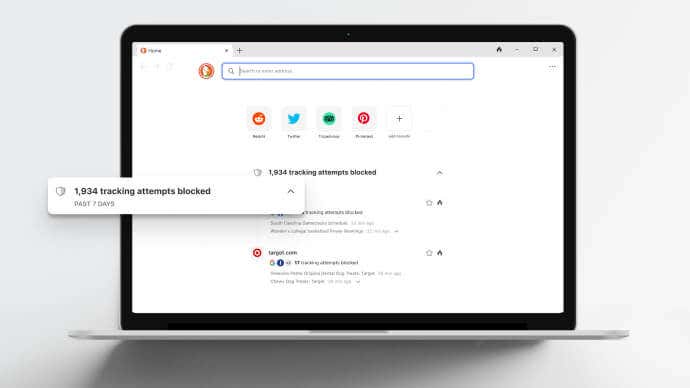
Your digital footprints are closely monitored, and the privacy of online activities is a pressing concern for many. DuckDuckGo, a privacy-focused search engine, promises a solution to those wary of having their search history tracked and used for targeted advertising or other purposes.
But does DuckDuckGo really fill this tall order? Is it a safe alternative to search engine giants like Google and Bing? Here’s what you need to know.
What Is DuckDuckGo?
DuckDuckGo is a search engine that prioritizes user privacy, avoiding the collection and use of personal data for ads. It promotes itself by claiming to give you a private, secure search experience, distinguishing itself from competitors by not tracking its users.
DuckDuckGo started as a small project to improve the overall search experience by reducing spam and protecting user privacy. It grew in popularity over the years, especially now that user privacy is a part of the conversation more frequently than it was in the early 2000s.
Here are some of the key privacy features of DuckDuckGo:
- No Tracking: Unlike many search engines, DuckDuckGo doesn’t track your searches or link them to your personal information. This means your search history isn’t used to tailor ads or results to you.
- Encryption: Searches made through DuckDuckGo are encrypted. This adds an extra layer of security and helps make your search activity more private.
- Embedded Social Media Protection: DuckDuckGo blocks social media trackers embedded in websites. This keeps Facebook from tracking your web activities.
- Privacy Grade Ratings: Each website you visit through DuckDuckGo search results gets a privacy grade from A to F. This rating helps you understand the site’s privacy practices at a glance.
- Global Privacy Control (GPC): It supports GPC, which lets you automatically communicate privacy preferences to websites, requesting that your browsing data not be sold or shared.
- Digital Rights Management (DRM) Permissions: DuckDuckGo manages permissions related to digital rights, so you have control over content access and distribution settings.
- Search Leakage Prevention: When you click on a result in DuckDuckGo, it prevents your search terms from being shared with the site you’re visiting, a common practice on other search engines that can compromise your privacy.
- Device Location Services: Sometimes you need a more localized search, which requires knowing your location. DuckDuckGo will prompt you to share your location with a site instead of it just doing it automatically. DuckDuckGo also won’t store your location details on its servers.
Why Privacy Matters in Search Engines
Search engines are a gateway to the internet. This convenience, though, comes at the cost of personal privacy. Major search engines collect data from users, like search queries, browsing history, locations, and even device information.
This data collection is driven by the business model of monetizing user information through targeted advertising, which raises important privacy concerns. The major concern is that your data is used to build a profile of yourself.
This profile can include intimate details about your interests, habits, behaviors, health concerns, financial status, and personal preferences. It allows for highly targeted ads, which is beneficial for marketing but terrible for your right to privacy.
Also, the collection and storage of your personal data by search engines brings up security risks. What happens if your data is exposed in a data breach? Your sensitive information is exposed, potentially resulting in identity theft, financial loss, or worse.
There’s also the concern of surveillance and censorship. There have been cases where search engines have been compelled by government authorities to hand over data, leading to concerns about the implications for freedom of speech and the right to privacy.
DuckDuckGo’s Limitations and Misconceptions
In response to these concerns, DuckDuckGo has built its platform with privacy as a foundational principle. However, its focus on privacy does lead to certain limitations in functionality compared to mainstream search engines like Google.
One notable area is personalized search results. Because DuckDuckGo doesn’t track search history or user behavior, it can’t tailor search results based on past queries. This means you may need to be more specific in your search terms to find what you’re looking for.
Another limitation is in local search capabilities. Without tracking location data, DuckDuckGo’s ability to provide localized search results is less precise than search engines that use location tracking. So you’ll need to include more geographic-specific info in your query to get relevant local results.
With its limitations in functionality, but strong focus on privacy, there’s a common misconception that DuckDuckGo offers complete online anonymity. It does enhance privacy by not tracking searching or storing personal data, but it doesn’t anonymize your internet activity. Your ISPs or network admins can still potentially see what sites you’re visiting, even if the searches leading to those sites aren’t tracked.
So, Is DuckDuckGo Safe?
DuckDuckGo uses several security measures mentioned earlier to protect user data. It doesn’t track or store your information, and it encrypts all search queries. So, there’s no eavesdropping, and the risk of personal data being exposed or used is significantly reduced.
When available, DuckDuckGO also uses HTTPS connections for all sites that it links to. This keeps the data transferred between the user and the website secure and not easily intercepted. DuckDuckGO also blocks trackers on websites.
So, DuckDuckGo is generally regarded as a safe and secure search engine, especially from a privacy perspective. But, again, no search engine can offer complete online anonymity. You should use DuckDuckGo in conjunction with other privacy tools, like VPNs and secure browsers, for a higher level of security and anonymity online.
Dodging Digital Trackers and Peeping Toms
DuckDuckGo champions privacy where digital surveillance is commonplace, offering a nice alternative for those cautious about their online footprint. Its many privacy-focused features directly address the growing issue of data privacy and security.
Just remember that your search results won’t be as personalized or offer the same local precision as Google or Bing. If you care about privacy over convenience, though, give DuckDuckGo a try.

